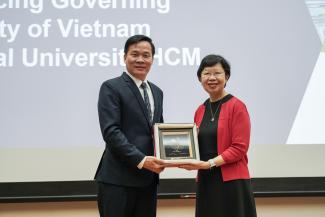
Rare stories of what goes on operationally each time a United Nations High Commissioner for Refugees (UNHCR) team is activated globally, honest revelations of how the Somaly Som scandal rocked the social sector in Cambodia, painful leadership dilemmas amidst shady business deals in Indonesia – these were some of the many lessons featured in the Southeast Asian Global Undergraduate Leaders’ (SEAGULL) programme held in January.
Selected for their passion and aptitude for societal change, 24 undergraduates from 11 Southeast Asian countries, including three SMU students, participated in the societal leadership programme organised by the Institute for Societal Leadership (ISL).
The first immersion of this two-part programme aimed to expand the young leaders’ understanding of regional societal opportunities and challenges, as well sharpen their critical thinking skills.
In its second installment, the immersion this year was designed to explore three key areas: social impact, cross-sector collaboration, and communication on contentious issues. Thematically, the programme centred on human rights challenges and education innovations.
Besides learning about ASEAN’s multi-faceted challenges from Ambassador Ong Keng Yong, the participants also enjoyed participating in Mr Gaurav Keerthi’s workshop, where he shared his long journey in promoting respectful and progressive debates in the public sphere, as well as tips on how to spur policy changes from the ground up.

[Photo: Mr Gaurav Keerthi, developer of Dialectic Singapore and a frequent host for debates on Channel NewsAsia (third from left), enjoyed a light moment as the participants captured some photographs with him.]
A key highlight of the programme included rare insights from former UNHCR Assistant High Commissioner for Operations, and ISL Board Member and SMU Fellow, Ms Janet Lim, who spoke on the region’s need to participate responsibly in the global refugee crisis, as well as her experiences in persuasion, coordination and negotiation. In managing difficult situations, she stressed the importance of three core skills: commitment, competency and collaboration.
This was reiterated in ISL’s Digital Narratives of Asia workshop, which featured revelations by societal leaders such as Chea Vannath, who shared her unorthodox philosophy of peace and reconciliation in post Khmer Rouge Cambodia.
Central to the programme was a study visit to a migrant workers’ social organisation, HealthServe, where participants engaged in a dialogue with a few injured workers from China and learnt about the challenges low-wage foreign workers face. To complement this, a facilitated trail around the Geylang neighbourhood was also included to help the young leaders understand how the influx of migrant workers has influenced the area’s development and social dynamics.

[Photo: Khee Shihui, Service For Asia Fellow (standing left), and Cai Yinzhou, Founder of Geylang Adventures (standing right), moderated a dialogue with three Chinese migrant workers at HealthServe organisation.]
In their visit to Crest Secondary School, participants saw how education experiences could be transformed by a strong vocational focus that is cemented by partnerships with the community and corporations, as well as an empathy-centric approach that anchors the institution.

[Photo: SEAGULL participants with a Crest Secondary school student (right) as he demonstrated their hands-on learning activities. The school adopts a very strong skills-based learning approach that takes into consideration diverse learning needs.]
Undergraduate participant Szaiffa Leya Tayong from Philippines said, “I'd definitely recommend SEAGULL to my fellow young leaders, because SEAGULL is different in a way that it doesn't just teach you about theories, or give you presentations on how to be a leader. SEAGULL actually presents you and introduces to you real leaders –grassroots leaders or those working in NGOs – like Riverkids and HealthServe, and even Geylang Adventures, to meet the founders and what their motivations are. From there, you get the real picture of society. When you're in school or back home, you feel sheltered and you don't really know what's happening. SEAGULL introduces you to that kind of reality – this is what's happening to society, and this is what you should do.”
Sovannaroth Tey from Cambodia, another participant, commented, “The most meaningful part of the programme for me was to be able to meet a lot of inspirational people, specifically Ms Janet Lim, who used to work for the UNHCR for over 34 years. And it was just a mind-blowing experience to meet someone of her calibre. She taught us very important lessons which we cannot learn from a textbook. She shared with us experience including her values, as well as the values of the United Nations when dealing with difficult tasks such as refugees' crisis in certain countries.”
This July, the SEAGULL participants would convene in Malaysia to delve deeper into the empathy-centred problem-solving approach via the analysis of a social organisation. It is ISL’s hope that these young adults will gain a deeper awareness of how they could carve a responsible, sustainable and meaningful role in their societies.
To learn more about ISL’s SEAGULL programme, please visit: http://isl.smu.edu.sg/seagull
[Featured photo: Ms Janet Lim, former UNHCR Assistant High Commissioner for Operations, ISL Board Member and SMU Fellow (second row sixth from left), has particular expertise in managing complex emergency operations where populations have been forcibly displaced due to war and conflict.]